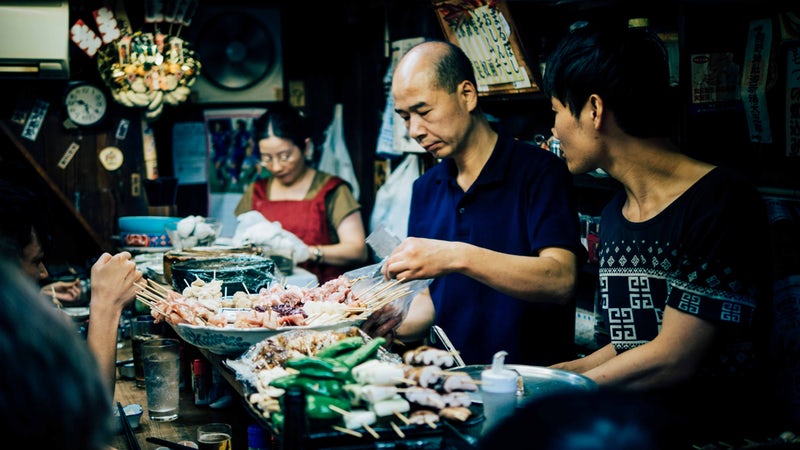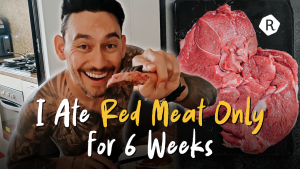Every day, if I arrive home just one minute past the 8 o’clock line, my mother would emerge from the bedroom and ask: ‘Have you eaten?’
If I had, she would leave me to my own devices.
If I had not, she would make a fuss in the kitchen, reheating dishes, boiling water for dumplings, and pulling the cling film off plates to check if they demand microwaving.
Then, she would sit at the table and watch me like a hawk to see if I was consuming the correct proportion of meat/veg/rice, as if I were an invalid whose very life hung in the precarious balance of every chop-sticked mouthful.
I’m used to it. This attention. The mini-crisis caused by going six hours without the life-giving essence of ‘proper’ home-cooked food. But above all, I’m used to the constant chorus of ‘Have you eaten?’—from family, friends and distant relatives who don’t even know my name.
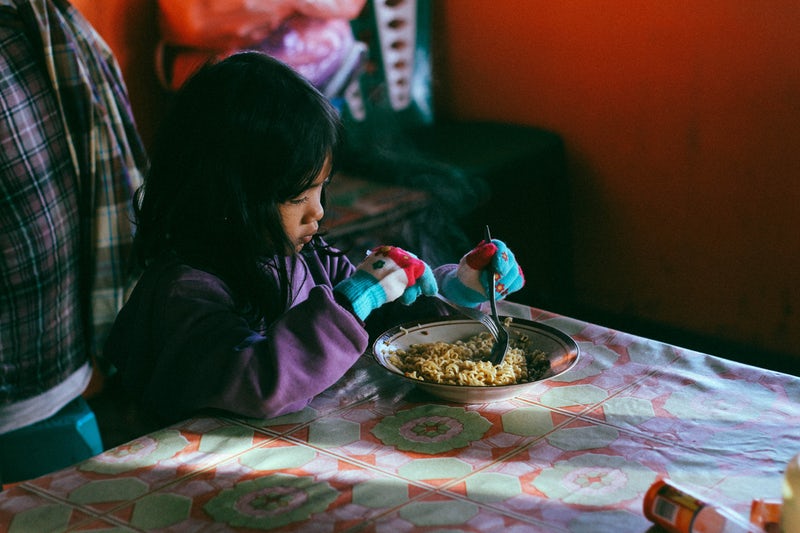
If you’re Singaporean—or an Asian of any hue—what I’ve described should be a familiar scene.
“Have you eaten” is the elevator music of family life. It is the beep of an EZ-link card and kaya atop your toast. So much a part of our social fabric that it barely warrants any thought.
Cultural depictions are rife. Jack Neo uses “Jiak Ba Buay?” to great comic effect in Money No Enough 2. BooksActually published a food memoir that uses ‘Have You Eaten’ in its title. In journalism, it seems that no Western journalist may transit in Changi without making some remark about the ‘tradition’ of greeting someone with a warm ‘Have You Eaten?’
Yet, for all of its ubiquity, no one knows where or how the phrase came about. Despite my best efforts and long hours wading through an academic swamp of citations and reviews, I found no credible or cohesive history of the popular phrase.
The earliest known appearance (that I could find) comes from China, 1076 AD, in a Song Dynasty treatise about rural customs/etiquette entitled Lu’s Township Conventions. It is essentially a list of do’s and don’ts for high-SES Augustmen in Ancient China.
Bone-dry reading even for AD 1077, but it does offer proof. The text’s author(s), imperial scholars all, writes, “When you visit your host, enquire of them if they’ve eaten… if they’re about to start, then it is polite to return when they’ve finished.”
The purpose? Avoid the ‘suspicion’ that you’re only visiting to enjoy free food.
Courteous indeed but very far removed from its modern meaning as both a greeting and a show of concerned affection. Nevertheless, the phrase caught on and many Dynasties later, it had become the de facto greeting of a crumbling empire. Before signing Taiwan, Korea and its balls over to Japan in the Treaty of Shimonoseki, diplomatic transcripts show that members of the Chinese delegation did not forget to enquire of one another: ‘You’ve Eaten?’
But the past is a foreign country, and in Singapore, the phrase belongs to no race or group in particular. A quick search through the National Archives Oral Histories shows that ‘Have you eaten’/’Sudah makan’ was in common parlance by colonial times and before the advent of household electricity.
The oldest recorded mention is a Singaporean of Sinhalese descent (AKA Sri Lanka) named Mrs Myna Ruth Segeram, who remembers hearing it from her maid back in 1920s Colombo.
Mysterious indeed.
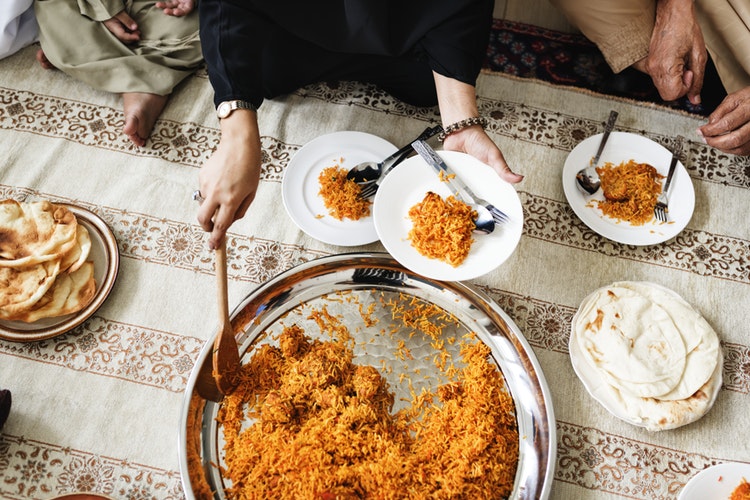
While the history of the phrase is murky at best, there is certainly no shortage of modern-day explanations/rationalisations by amateurs and auteurs alike. The big question mark hanging over its origin has not stopped contemporary writers from trying to understand why Asians express themselves ‘through food.’
Ask your parents or grandparents to explain the phrase, and they will most likely offer what I call ‘The Hardship Theory Of Everything’ AKA ‘Last Time Not Enough Food To Eat’. This thesis explains the prevalence of food in language by pointing to its frequent absence—in times of famine, recession or war.
In other words, the phrase is born of a genuine concern about starvation or malnutrition.
Ask a millennial, however, and you will be confronted with a different answer. If the captive millennial in your basement is one of those Westernised Asians who discovered their Asian-ness whilst studying in Melbourne, they will likely subscribe to the ‘Emotional Repression Hypothesis Of Food.’ In contrast to their parents’ materialistic view, they see food as means of expressing affection in a society that frowns upon emotional incontinence.
In other words, food becomes an oblique way of saying the unsayable ‘I love you’.
With the rise of ‘foodie culture’, this explanation has become as ubiquitous as the phrase it purports to explain. It can be found anywhere from The Atlantic to Zula to erm … a niche-interest website called RICE.
In print, it takes the form of cliches like ‘Food brings us together’ or ‘Food is a way of showing you care’. On screen, it wears the guise of a thinly-disguised Ah ma—your grandma, really—painstakingly cutting ginger in slow-motion.
Unlike our phrase of indeterminate origin, this hypothesis can be traced back to director Ang Lee’s (AKA Mr Brokeback Mountain) 1994 film Eat Drink Man Woman, which showcased this ‘food = Asian love’ insight to great acclaim.
Don’t take my word for it; trust in Anthony Bourdain, who said of the film’s culinary leitmotif that it’s not about the food, it’s about ‘communication—the struggle to receive and express love’.
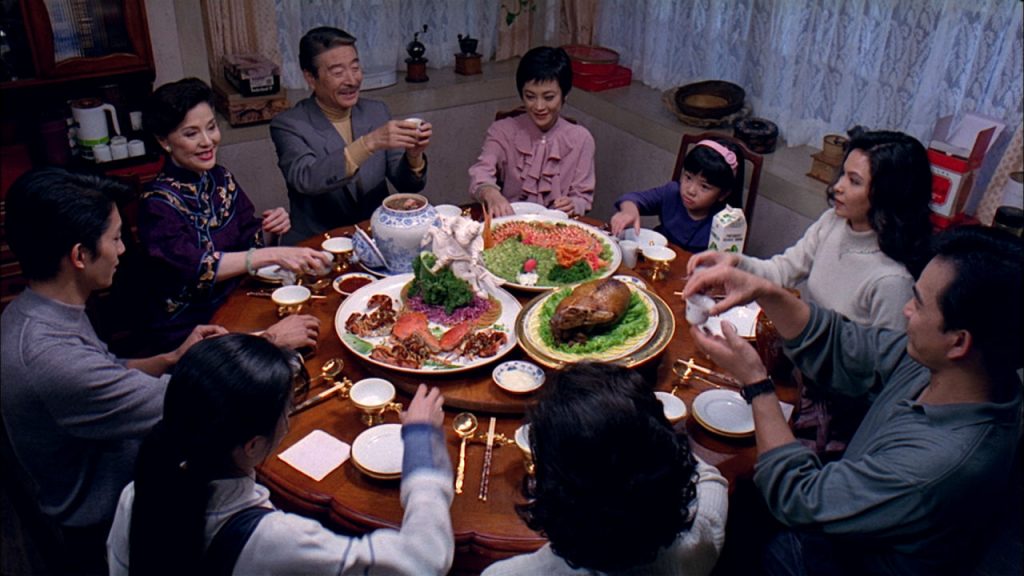
So who’s right? The millennials or their parents?
To be honest, I haven’t the slightest clue. At the expense of sounding like a GP teacher, both sides are equally valid and equally flawed. The deprivation explanation ignores the universality of deprivation as an experience, while the repression hypothesis sounds a bit like Asian self-stereotyping.
After all, not every Western father is a hairy cheerleader and not every Asian mother is LKY in drag.
But whichever side you choose, choose quickly, because I suspect that ‘Have you eaten?’ is a greeting slowly going out of fashion.
Not to sound alarmist, but think back on the last time someone showed concern by asking about your stomach. Minus the colleagues inviting you to lunch or a McDelivery jio, it was probably a relative, someone older and less Westernised. Between close friends of a similar age and background, it seemed to have been supplanted by more Western greetings like ‘How’ve you been?’ or ‘How’s it going?’
It’s true for me, at least. Friends under interrogation insist that ‘Have You Eaten?’ is very much alive, but when asked to recall their last encounter, answers invariably skew towards inter-generational anecdotes.
“Relatives lor” is the top reply, and “Small-talk with taxi drivers” emerged as a runner-up because many feel compelled to make conversation after the initial “PIE or CTE?” decision.
For one army friend, the phrase is a mainstay when speaking to pakciks around the school. Personally, my biggest source of ‘Have You Eaten?’ outside the home comes from neighbourhood aunties, who instinctively level the question at me, even though there’s a pack of nasi lemak in my hand.
So will the phrase die out in some not-too-distant future? Given the steady march of Westernisation, it’s not too difficult to imagine a Singapore without ‘Have You Eaten?’.
However, I highly doubt if a more existential concern will ever replace our obsession with food with ‘well-being’.
“How are you doing?”, You may ask.
And I will answer: “I’m fine, but mainly because I’ve just eaten a good lunch.”

